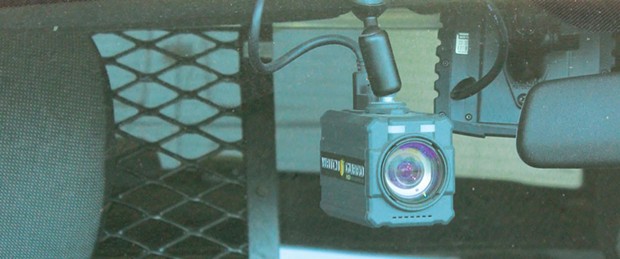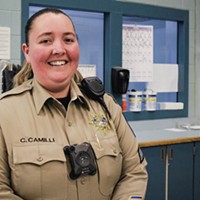News Blog

- Thadeus Greenson
- The dash camera in a Eureka Police Department patrol car.
The city of Eureka is “evaluating its options” with regard to this week’s appellate court ruling that it must release a police dash camera video capturing the controversial arrest of a 14-year-old suspect.
In its published opinion released late Tuesday, the California First District Court of Appeals ruled that the video in question cannot be considered a confidential police officer personnel record as the city claimed. Consequently, the court upheld a May 21, 2015, ruling by Humboldt County Superior Court Judge Christopher Wilson, which granted a Journal petition seeking release of the video and found the public’s interest in the release of the video outweighed any privacy concerns.
In a press release issued this afternoon from the office of City Manager Greg Sparks, the city states that its interest in fighting release of the video was “not to quash transparency but to ensure that the right of privacy of police officers in their personnel records was not eroded.” The press release then quotes Eureka City Attorney Cyndy Day-Wilson lamenting the court’s ruling.
“It is unfortunate that the court gave little value to the fact that the videos are prepared for the purpose of evaluating officers,” she said, echoing a point she made at oral arguments in the case. “Instead, it focused on the timing of the initiation of the formal investigation and when the video was taken.”
Specifically, the court found that the video was not generated as part of an internal affairs investigation and didn’t relate directly to an officer’s advancement, appraisal or discipline.
“The video is simply a visual record of the minor’s arrest,” Presiding Justice Barbara Jones wrote in the court’s unanimous opinion. “Adopting the city’s broad reading [of the law] would improperly sweep virtually all [police videos] into the protected category of personnel records … At oral argument, the city claimed dashboard camera videos come within [the class of protected personnel records] because the police department might eventually use the videos to evaluate whether to initiate disciplinary proceedings against a peace officer. We are not persuaded.”
The city has until Aug. 29 to petition the California Supreme Court to review the appellate ruling.
For more about the case, including a rundown of the underlying facts and links to the court’s opinion and other court documents filed in the case, see past Journal coverage here. The full press release from the city is copied below and available here in PDF form.
Editor's note: In the interest of full disclosure, it should be noted that this reporter personally filed the petition seeking disclosure of the dash cam video in this case and authored the lower court briefings on behalf of the Journal.
RE: Eureka – Police Video - Press Statement
During a time of significant turmoil between police officers and the communities that they protect, the California Court of Appeals elected to release a video of a former Eureka police sergeant during the arrest of a minor. The availability of that dash cam video was a result of the Eureka City Council’s foresight to fund the recording of police interactions during traffic stops and arrests. This particular video was brought to light as a result of a Eureka police officer who witnessed behavior that he felt should be reported and notified his command to the existence of the video. An Internal Affairs (IA) investigation was conducted and the sergeant ultimately separated employment from the City.
Under the Eureka Mayor and City Council, the City has sought to bring additional transparency and demonstrate that the police have been and are willing to proactively address internal problems. City leadership takes very seriously the abuse of police authority and has a zero tolerance level for abuse or prejudice. The City Attorney has worked with Chief Mills and other department heads to ensure cases of misconduct once sustained are aggressively prosecuted and appropriate disciplinary action sought, up to and including termination.
The case before the Court of Appeal, however, was not about transparency but about ensuring the protection of police officer personnel records. This is a right guaranteed by the California Constitution and state statutes. The City’s intent in bringing the appeal was not to quash transparency but to ensure that the right of privacy of police officers in their personnel records was not eroded. According to City Attorney Cyndy Day-Wilson “It is unfortunate that the court gave little value to the fact that the videos are prepared for the purpose of evaluating officers. Instead, it focused on the timing of initiation of the formal investigation and when the video was taken. ”
Eureka has recently purchased body cameras for patrol officers and investigators to increase police accountability and collect evidence for future prosecutions. The Chief’s Advisory Panel has the duty to review Internal Affair’s investigations, including the review of police video, to ensure the Department is accountable for its findings. For further information on this topic, the Body Worn Camera (BWC) policy can be found on the City website for public inspection. The City will nevertheless continue leading the way in the development of body cameras and police oversight.
The City is currently evaluating its options with regard to the release of the video.


Comments (2)
Showing 1-2 of 2